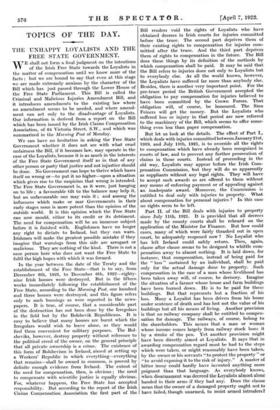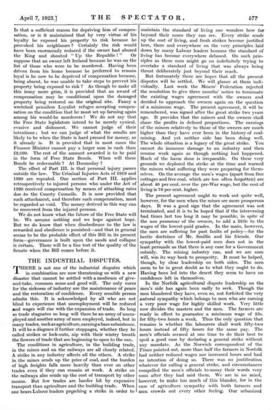TOPICS OF THE DAY.
THE UNHAPPY LOYALISTS AND THE FREE STATE GOVERNMENT.
WE shall not form a final judgment on the intentions of the Irish Free State towards the Loyalists in the matter of compensation until we know more of the facts ; but we are bound to say that even at this stage we are made extremely anxious by the character of the Bill which has just passed through the Lower House of the Free State Parliament. This Bill is called the Criminal and Malicious Injuries Amendment Bill, and it introduces amendments to the existing law where no amendment seems to be needed, and where amend- ment can act only to the disadvantage of Loyalists. Our information is derived from a report on the Bill which has been issued by the Irish Claims Compensation Association, of 64 Victoria Street, S.W. and which was summarized in the Morning Post of Monday.
We can have no hesitation in asking the Free State Government whether it does not see with what cruel unfairness the Bill, if it becomes law, may operate in the case of the Loyalists, because it is as much in the interests of the Free State Government itself as in that of any other person or party that justice and not injustice should be done. No Government can hope to thrive which bases itself on wrong or—to put it no higher—upon a situation which gives rise to the suspicion that wrong is intended. The Free State Government is, as it were, just hanging on to life ; a favourable tilt to the balance may help it, but an unfavourable one may ruin it ; and among the influences which make or mar Governments in their early stages none is more potent than the opinion of the outside world. It is this opinion which the Free State can now mould, either to its credit or its detriment. The need for compensation will be an immense subject before it is finished with. -Englishmen have no longer any right to dictate to Ireland, but they can warn. 'Irishmen will make the greatest possible mistake if they imagine that warnings from this side are arrogant or malicious. They are nothing of the kind. There is not a sane person here who does not want the Free State to fulfil the high hopes with which it was formed.
In the year between the date of the Treaty and the establishment of the Free State—that is to say, from December 6th, 1921, to December 6th, 1922-eighty- nine Irish houses were destroyed. But in the fifteen weeks immediately following the establishment of the Free State, according to the Morning Post, one hundred and three houses were destroyed, and this figure refers only to such burnings as were reported in the news- papers. It is true, of course, that a considerable part of the destruction has not been done by the Irregulars in the field but by the Bolshevik Republicans. It is easy to believe that many houses are burnt which the Irregulars would wish to leave alone, as they would find them convenient for military purposes. The Bol- sheviks, however, destroy property without reference to the political creed of the owner, on the general principle that all private ownership is a crime. The existence of this form of Bolshevism in Ireland, aimed at setting up a Workers' Republic in which everything—everything that remains—shall be owned in common, is proved by definite enough evidence from Ireland. The extent of the need for compensation, then, is obvious ; the need to compensate with scientific justice is equally obvious. For, whatever happens, the Free State has accepted responsibility. But according to the report of the Irish Claims Compensation Association the first part of the Bill renders void the rights of Loyalists who have obtained decrees in Irish courts for injuries committed before the truce. The second part deprives them of their existing rights to compensation for injuries com- mitted after the truce. And the third part deprives them of rights to compensation in the future. The Bill does these things by its definition of the methods by which compensation shall be paid. It may be said that the Bill refers to injuries done not only to Loyalists but to everybody else. As all the world knows, however, the Loyalists have suffered far more than anybody else. Besides, there is another very important point. For the pre-truce period the British Government accepted the obligation to pay compensation for injuries believed to have . been committed by the Crown Forces. That obligation will, of course, be honoured. The Sinn Feiners will get the money. But the Loyalists who suffered loss or injury in that period are now referred to the machinery of the Bill, which seems to offer some- thing even less than paper compensation.
But let us look at the details. The effect of Part I., which deals with injuries committed between January 21st, 1919, and July 11th, 1921, is to override all the rights to compensation which have already been recognized in courts of law, and to prevent any further prosecution of claims in those courts. Instead of proceeding in the old way, Loyalists may appear before the Irish Com- pensation Commission, but they will do so apparently as suppliants without any legal rights. They will have to accept such awards as are offered to them without any means of enforcing payment or of appealing against an inadequate award. -Moreover, the Commission is entitled to deal only with injuries to property. What about compensation for personal injuries ? In this case no rights seem to be left.
Part II. of the Bill deals with injuries to property since July 11th, 1921. It is provided that all decrees made by the county courts shall be reheard on the application of the Minister for Finance. But how could cases, many of which were fairly thrashed out in open court, be adequately reopened now ? No Loyalist who has left Ireland could safely return. Then; again, clause after clause seems to be designed to whittle com- pensation away to almost nothing. It is laid down, for instance, that compensation, instead of being paid for the " loss " sustained by an individual, shall be paid only for the actual damage done to -property. -Such compensation in the case of a man whose livelihood has been taken away will, of course, be derisory. Imagine the situation of a farmer whose house and farm buildings have been burned down. He is to be paid for those buildings. But that represents but a fraction of his loss. Many a Loyalist has been driven from his home under sentence of death and has lost not the value of his buildings but all his means of living. Another provision is that no railway company shall be entitled to compen- sation for damage. The railways, of course, belong to the shareholders. This means that. a man or woman whose income comes largely from railway stock loses it by a stroke of the pen. Yet another provision might have been directly_ aimed at Loyalists. It says that in awarding compensation regard must be had to the steps which were taken, or might reasonably have been taken, by the owner or his servants "to protect the property" or "to avoid exposing it to the risk of injury." A master of bitter irony could hardly have invented anything more poignant than that language. As everybody knows, when disarmament was decreed the Loyalists almost alone handed in their arms if they had any. Does the clause mean that the owner of a damaged property ought not to have failed, though unarmed, to resist armed intruders? Is that a sufficient reason for depriving him of compen- sation, or is it maintained that by very - virtue -of his loyalty he exposed his property to risk because he provoked his neighbours ? Certainly the risk would have, been enormously reduced if the owner had abused the King and shouted "Up the Republic I" Or suppose that an owner left Ireland because he was on the list of those who were to be murdered. - Having been driven from his home because he preferred to remain loyal is he now to be deprived of compensation because, being absent, he was unable to take steps to prevent his property being exposed to risk ? As though to make all this irony more grim, it is provided that an award of compensation may be conditional upon the damaged property being restored on the original site. Fancy a wretched penniless Loyalist refugee accepting compen- sation on the condition that he must set up farming again among his would-be murderers I We do not say that the Free State legislators intend to be merely cynical. evasive and dishonest. We cannot judge of their intentions ; but we can judge of what the results are likely to be when the State is hard pressed for money, as it already is. It is provided that in most cases the Finance Minister cannot pay a larger sum in cash than £2,000. The rest of the amount awarded is to be paid in the form of Free State Bonds. When will these Bonds be redeemable ? At Doomsday ?
The. effect of Part III. is that personal injury passes outside the law. The Criminal Injuries Acts of 1919 and 1920 are repealed. One section of. Part III. applies retrospectively, to injured persons who under the Act of 1920 received compensation by means, of attaching rates due .,to the County Councils. It is now provided . that such attachment, and therefore such compensation, must be regarded as void. The money derived in this way can be recovered from the injured persons. We do not know _what the future of the Free State will be. We . assume nothing and we hope against hope. But we do know that when disobedience to the law is rewarded and obedience is punished—and that in general seems to be the 'probable effect of this Bill in its present form—governance is built upon the sands and collapse is certain. There will be a fine test of the quality of the Senate when the Bill comes before it.











































 Previous page
Previous page